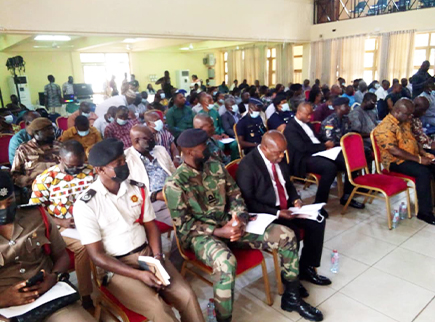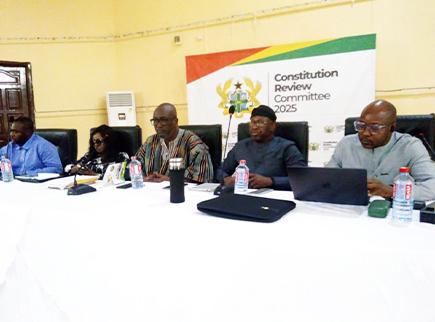Persons with Disabilities (PWDs) have made a heartfelt appeal to the Constitutional Review Committee to amend the 1992 Constitution to criminalise the use of derogatory terms such as “Mumu” and “Tokunɔ” often used to demean them.
They described such labels as deeply offensive and harmful to their dignity and wellbeing and called on lawmakers to take steps to protect their rights and identity through stronger legal provisions.
The appeal was made during the fifth zonal stakeholder engagement meeting of the Constitutional Review Committee, held in Ho on Thursday.
A hearing-impaired participant, who withheld his name, lamented that beyond verbal abuse, PWDs face systemic neglect, especially at public institutions such as hospitals and police stations.
He noted that the lack of sign language interpreters in such spaces creates barriers to accessing justice and healthcare.
“It is painful and frustrating. When we go to the hospital or the police station, we struggle to communicate. The constitution must compel these institutions to provide interpreters and make our lives easier,” he said

Another participant, a woman with a physical disability, called on the Committee to recommend tax exemptions on assistive devices like wheelchairs and white canes and other tools, which have become unaffordable for many due to import costs.
She also raised concerns about the lack of disability-friendly infrastructure, saying many buildings remain inaccessible despite the passage of the Disability Act more than a decade ago.
Prof. Henry Kwesi Prempeh, Executive Director of the Centre for Democratic Development (CDD) and Chairman of the Constitutional Review Committee, acknowledged the concerns, emphasising that while the Constitution provides for the rights of persons with disabilities, implementation remains weak.
He referenced Article 29 of the 1992Constitution of Ghana, which guarantees the rights of PWDs, including the provision of “special facilities” in legal, educational, and other state services.
“The principle exists in the Constitution – the right to accessible services is clear. But we have a problem with enforcement and compliance. Even Parliament itself has inaccessible offices, despite the Disability Act being in force,” he said.
Prof. Prempeh suggested that future amendments should include mandatory timelines for passing Legislative Instruments (LIs) to support Acts of Parliament, citing several laws that remain ineffective due to the absence of enforcement frameworks.
“We can pass beautiful laws, but without the necessary regulations and commitment to implementation, they remain words on paper.”
The stakeholder engagement brought together a wide array of interest groups including Disability Unions, Youth Associations, Artisan Groups, Security Services, the Volta Chapter of the Ghana Journalists Association (GJA), Civil Society Organizations (CSOs), NGOs, the National Commission for Civic Education (NCCE) and concerned citizens.
Their submissions formed part of ongoing national efforts to review the 1992 Constitution to reflect evolving social, economic, and human rights challenges in Ghana.

